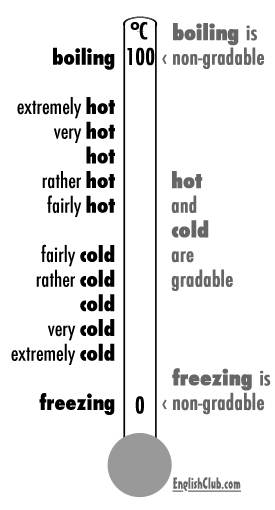
Gradable and Non-gradable Adjectives
 Adjectives describe
qualities (characteristics) of nouns.
Adjectives describe
qualities (characteristics) of nouns.
The adjectives freezing, dead and nuclear arenon-gradable.
Gradable Adjectives
A gradable adjective can be used with "grading adverbs" that vary the adjective's grade or intensity. Look at these examples:
|
grading adverbs |
+ |
gradable adjectives |
"Gradable adjectives" are also called "qualitative adjectives". "Grading adverbs" are also called "submodifiers".
A gradable adjective can also have comparative and superlative forms:
Look at these example sentences:
The adjective dead is non-gradable because it is an absolute. Dead is dead. We cannot be more or less dead. One person cannot be "deader" than another. Other absolutes include: correct, unique, perfect
Non-gradable Adjectives
A non-gradable adjective cannot be used with grading adverbs:
Non-gradable adjectives do not normally have comparative and superlative forms:
Often, non-gradable adjectives are used alone:
Don't
try to learn lists of gradable and non-gradable adjectives! It's better to
understand what makes an adjective gradable or non-gradable. This is a matter
of logic and common sense. Most native-speakers have never heard of gradable
and non-gradable adjectives. They just "feel" that it doesn't make
sense to say "fairly excellent" or "very unique".
You probably have the same idea in your language.
However, a non-gradable adjective can be used with "non-grading adverbs" (which usually just give the adjective extra impact), for example:
|
non-grading adverbs |
non-gradable adjectives |
|
|
absolutely |
awful |
extreme |
|
utterly |
excellent |
|
|
completely |
terrified |
|
|
totally |
dead |
absolute |
|
nearly |
impossible |
|
|
virtually |
unique |
|
|
essentially |
chemical |
classifying |
|
mainly |
digital |
|
|
almost |
domestic |
|
Here are some example sentences with non-gradable adjectives:
Adjectives that can be gradable and non-gradable
Some adjectives may have more than one meaning or sense. It's possible for the same adjective to be gradable with one sense and non-gradable with another sense. For example:
|
|
adjective |
common = |
|
He's got a very old car. |
gradable |
not young |
|
I saw my old boyfriend yesterday. |
non-gradable |
former, ex- |
|
He has some dreadfully common habits. |
gradable |
vulgar |
|
"The" is a very common word in English. |
gradable |
prevalent |
|
The two countries' common border poses problems. |
non-gradable |
shared |
Adverbs used with gradable and non-gradable adjectives
The adverbs really (very much) and fairly and pretty (both meaning "to a significant degree, but less than very") can often be used with gradable and non-gradable adjectives:
|
gradable |
non-gradable |
|
Please don't forget! It's really important. |
He was really terrified. |
|
He's a fairly rich man. |
It's a fairly impossible job. |
|
He's pretty tall. |
It's pretty ridiculous when you think about it. |
"Quite" with gradable and non-gradable adjectives
The meaning of the adverb "quite" changes according to the type of adjective we use it with:
|
|
adjective |
quite = |
|
It's quite warm today. |
gradable |
fairly, rather |
|
Are you quite certain? |
non-gradable |
completely, absolutely |
Reference
|
Non-gradable adjectives |
|
Although we don't recommend that you learn lists of non-gradable adjectives, here are some for reference. You can decide for yourself whether they are extreme, absolute or classifying. |
|
alive, awful, black, boiling, certain, correct, dead, domestic, enormous, environmental, excellent, freezing, furious, gigantic, huge, immediately, impossible, miniscule, mortal, overjoyed, perfect, pregnant, principal, ridiculous, superb, terrible, terrified, unique, unknown, white, whole |
|
Non-grading adverbs |
|
Again, no need to learn lists. Here are a few examples. There are many more. Remember that you cannot use all non-grading adverbs with all non-gradable adjectives. Some collocate (go together). Some don't. |
|
absolutely, almost, completely, entirely, exclusively, fully, largely, mainly, nearly, perfectly, practically, primarily, utterly, virtually |
Материалы на данной страницы взяты из открытых источников либо размещены пользователем в соответствии с договором-офертой сайта. Вы можете сообщить о нарушении.